九年级英语全册教案(新人教版)
新人教版英语九年级下册全册教案
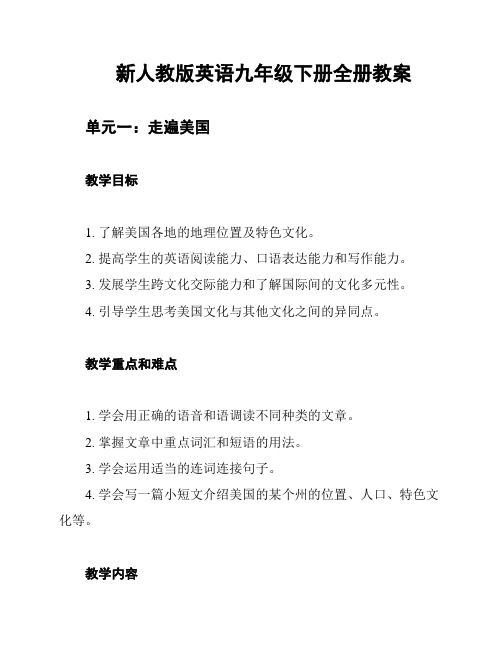
新人教版英语九年级下册全册教案单元一:走遍美国教学目标1. 了解美国各地的地理位置及特色文化。
2. 提高学生的英语阅读能力、口语表达能力和写作能力。
3. 发展学生跨文化交际能力和了解国际间的文化多元性。
4. 引导学生思考美国文化与其他文化之间的异同点。
教学重点和难点1. 学会用正确的语音和语调读不同种类的文章。
2. 掌握文章中重点词汇和短语的用法。
3. 学会运用适当的连词连接句子。
4. 学会写一篇小短文介绍美国的某个州的位置、人口、特色文化等。
教学内容1. 阅读、理解及运用文章作为美国各地城市和自然环境的介绍,从而研究如何写一篇介绍自己的县市、城市或者乡村的文章。
2. 研究如何结合词汇、语法和写作要素创造精彩的英语作文。
3. 通过各种交际活动和讨论,使学生掌握交际技能,了解与美国文化相关的话题,并提高其语音和语调的表达能力。
单元二:同一首歌教学目标1. 理解并掌握歌曲的歌词和歌曲的文化内涵。
2. 培养学生的听力、口语、阅读和写作能力。
3. 帮助学生了解其他国家的音乐文化,拓宽学生的国际视野。
教学重点和难点1. 掌握歌曲的发音和歌词。
2. 理解歌曲并分析其文化内涵。
3. 运用所学的词汇和语法书写一篇简单的歌曲感悟。
教学内容1. 研究歌曲的发音和歌词。
2. 分析歌曲的文化内涵及其背景。
3. 通过听、说、读、写各种交际活动和练,使学生在熟悉歌曲的基础上增加英文交际语言的使用机会。
单元三:说文明话,树新风教学目标1. 学会使用礼貌用语和日常英语;2. 研究并掌握书信的写作格式;3. 提高学生的英语阅读、听力、口语和写作能力;4. 培养学生的交际能力和创新意识。
教学重点和难点1. 细致领会礼貌用语的使用方法;2. 研究书信的写作格式,掌握书信写作的各个方面;3. 阅读一篇友谊书信,并学会如何写一封自己的信。
教学内容1. 研究礼貌用语和日常口语表达,重点讲授如何让学生用礼貌用语表达自己的感情和态度;2. 介绍书信的写作格式,重点介绍信件的开头、正文、结尾等格式;3. 研究如何书写一篇友谊书信,从而增强学生的阅读、写作和交际能力。
人教版九年级英语全册教案

人教版九年级英语全册教案教案标题:人教版九年级英语全册教案教案目标:1. 通过本教案的学习,学生将能够掌握九年级英语全册所涵盖的语法、词汇和听说读写技能。
2. 培养学生的英语学习兴趣,提高他们的自主学习能力和合作学习能力。
3. 培养学生的跨文化交际意识,增强他们的跨文化交流能力。
教学重点:1. 掌握九年级英语全册的语法知识和词汇量。
2. 提高学生的听说读写能力。
3. 培养学生的跨文化交际意识。
教学难点:1. 帮助学生理解和运用九年级英语全册的语法知识。
2. 提高学生的听力和口语表达能力。
3. 培养学生的跨文化交际能力。
教学准备:1. 九年级英语全册教材和教学辅助资料。
2. 多媒体设备和相关课件。
3. 学生课本和练习册。
教学过程:Unit 1: Hello!Lesson 1: Greetings and IntroductionsStep 1: Warm-up- 通过展示与问答的形式,复习和引入与问候和介绍相关的词汇和表达方式。
Step 2: Presentation- 使用多媒体设备和图片,展示不同国家的问候方式和介绍习惯,引发学生的兴趣和好奇心。
Step 3: Practice- 学生分组进行角色扮演,模拟不同场景下的问候和介绍情景,并通过互动练习加深对语言的理解和运用能力。
Step 4: Consolidation- 向学生介绍并解释本课时的重点词汇和语法知识,帮助他们理解和掌握。
Step 5: Extension- 提供一些额外的练习和活动,以巩固学生对本课时所学内容的掌握,并扩展他们的思维和表达能力。
Step 6: Homework- 布置相关的课后作业,包括练习册上的题目和口头作业,以巩固学生对本课时所学内容的掌握。
教学评价:1. 教师通过观察学生在课堂上的表现和参与度,评价他们对本课时所学内容的理解和掌握程度。
2. 学生完成的课后作业和口头作业,以及课堂上的小组活动和角色扮演,也可作为评价学生学习情况的依据。
最新九年级英语全册(人教版)配套教学教案 (全册)

全新修订版教学设计(教案全)九年级英语全册老师的必备资料家长的帮教助手学生的课堂再现人教版目录Unit 1How can we become good learners (003)Unit 2I think that mooncakes are delicious! (013)Unit 3 Could you please tell me where the restrooms are? (023)Unit 4I used to be afraid of the dark (031)Unit 5What are the shirts made of? (042)Unit 6When was it invented? ....................... (054)Unit 7Teenagers should be allowed to choose their own clothes (064)Unit 8It must belong to Carla (074)Unit 9I like music that I can dance to (083)Unit 10You're supposed to shake hands....... (093)Unit 11Sad movies make me cry (102)Unit 12Life is full of the unexpected..... . (122)Unit 13We are trying to save the earth! (156)Unit 14I remember meeting all of you in Grade 7 (172)Unit 1How can we become good learners?第一课时Section A(1a-2d)I. Target Navigation【目标导航】◆Key words and phrases:textbook,conversation,aloud,pronunciation,sentence,patient,by+v.ing◆Key sentences:(1)How do you study for a test?I study by working with a group.(2)Have you ever studied with a group?Yes,I have. I've learned a lot that way.(3)It's too hard to understand spoken English.◆Skills:能够熟练地谈论怎样学习的话题,以及回答自己的学习方式。
新人教版九年级英语上册全册教案
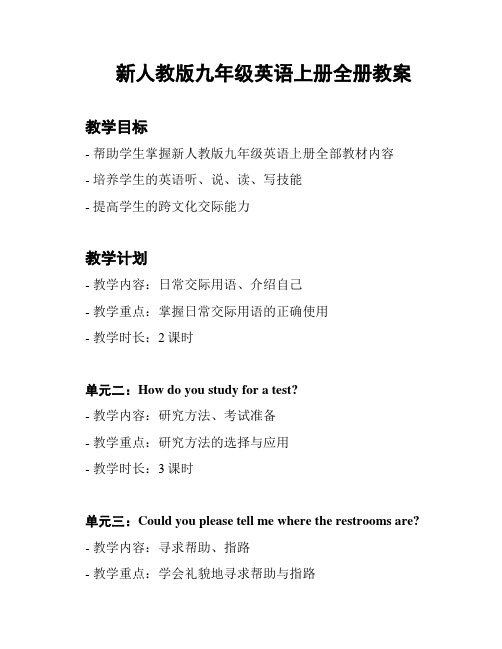
新人教版九年级英语上册全册教案教学目标- 帮助学生掌握新人教版九年级英语上册全部教材内容- 培养学生的英语听、说、读、写技能- 提高学生的跨文化交际能力教学计划- 教学内容:日常交际用语、介绍自己- 教学重点:掌握日常交际用语的正确使用- 教学时长:2课时单元二:How do you study for a test?- 教学内容:研究方法、考试准备- 教学重点:研究方法的选择与应用- 教学时长:3课时单元三:Could you please tell me where the restrooms are? - 教学内容:寻求帮助、指路- 教学重点:学会礼貌地寻求帮助与指路- 教学时长:2课时单元四:I used to be afraid of the dark.- 教学内容:过去的经历和惯- 教学重点:掌握过去式的使用- 教学时长:2课时单元五:What are the benefits of going green?- 教学内容:环境保护、可持续发展- 教学重点:理解环境保护的重要性- 教学时长:3课时单元六:I love music that I can dance to.- 教学内容:音乐、电影与艺术- 教学重点:学会表达自己对音乐、电影和艺术的喜好和感受- 教学时长:2课时单元七:Teenagers should be allowed to choose their own clothes.- 教学内容:青少年的权利与责任- 教学重点:理解和讨论青少年应有的权利与责任- 教学时长:3课时单元八:Reading for pleasure- 教学内容:阅读和写作- 教学重点:培养学生的阅读兴趣和写作能力- 教学时长:4课时单元九:Wildlife protection- 教学内容:野生动物保护- 教学重点:了解野生动物保护的重要性,并表达自己的看法- 教学时长:2课时单元十:Musical instruments- 教学内容:乐器与音乐- 教学重点:了解各种乐器和音乐类型,并能进行简单的介绍- 教学时长:3课时教学评价- 结合课堂表现、作业成绩、测试等多种评价方式进行评价- 通过个人表现、小组合作等方式培养学生的主动研究能力- 鼓励学生参与课堂互动,提高口语表达能力参考资料- 教材:新人教版九年级英语上册- 辅助教材:听力材料、课外阅读材料等。
最新 人教版九年级 英语上册全册教案
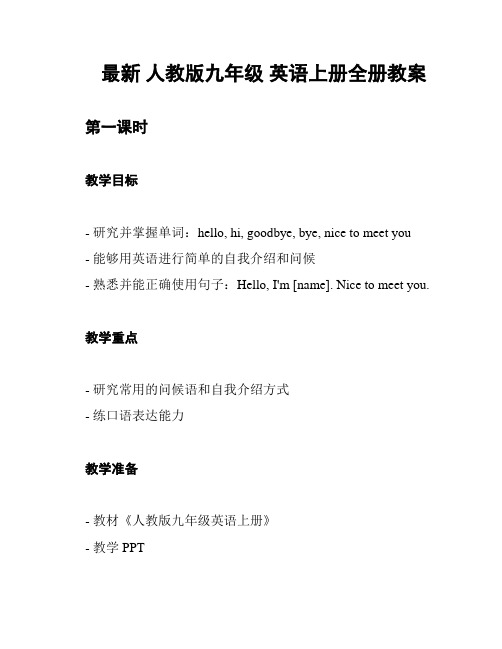
最新人教版九年级英语上册全册教案第一课时
教学目标
- 研究并掌握单词:hello, hi, goodbye, bye, nice to meet you
- 能够用英语进行简单的自我介绍和问候
- 熟悉并能正确使用句子:Hello, I'm [name]. Nice to meet you. 教学重点
- 研究常用的问候语和自我介绍方式
- 练口语表达能力
教学准备
- 教材《人教版九年级英语上册》
- 教学PPT
教学步骤
1. 导入新课,向学生简要介绍本节课的内容,并激发学生研究
的兴趣。
2. 分发教材,让学生跟读单词:hello, hi, goodbye, bye, nice to meet you。
3. 解释单词的意思,帮助学生掌握词汇。
4. 利用示范和展示图片等方式,让学生理解并掌握句子:Hello, I'm [name]. Nice to meet you.
5. 引导学生进行口语练,让他们用所学内容进行自我介绍和问候。
6. 收集学生的口语表达,进行点评和纠正。
7. 结束本节课,作简单复,并布置下节课的预内容。
教学延伸
- 练更多的问候语和自我介绍方式,丰富学生的口语表达能力。
- 制作小组或角色扮演活动,让学生在真实情境中运用所学内容。
教学评价
- 观察学生的参与程度和口语表达能力,及时给予鼓励和指导。
- 收集学生的口头回答、书面练习,进行评估和改进教学策略。
人教版英语九年级全一册教案:Unit1SectionA(4a-4c)
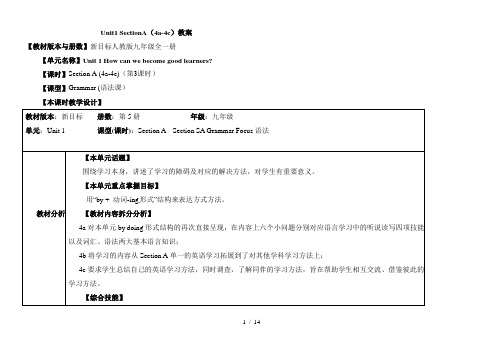
Unit1 SectionA(4a-4c)教案【教材版本与册数】新目标人教版九年级全一册【单元名称】Unit 1 How can we become good learners?【课时】Section A (4a-4c)(第3课时)【课型】Grammar (语法课)【本课时教学设计】教材版本:新目标册数:第5册年级:九年级单元:Unit 1 课型(课时):Section A Section SA Grammar Focus语法教材分析【本单元话题】围绕学习本身,讲述了学习的障碍及对应的解决方法,对学生有重要意义。
【本单元重点掌握目标】用“by + 动词-ing形式”结构来表达方式方法。
【教材内容拆分分析】4a对本单元by doing形式结构的再次直接呈现,在内容上六个小问题分别对应语言学习中的听说读写四项技能以及词汇、语法两大基本语言知识;4b将学习的内容从Section A单一的英语学习拓展到了对其他学科学习方法上;4c要求学生总结自己的英语学习方法,同时调查,了解同伴的学习方法,旨在帮助学生相互交流、借鉴彼此的学习方法。
【综合技能】1 / 142 / 14附:教学活动设计3 / 14/physics/chemistry?Do you learn history and geographyby________?学习兴趣DE LC5 2 获Step2Pre-Task(5 mins)Step 3While-TFind the new words and phrases重复,重做________物理__________化学___________记忆,记住________练习做某事_____________做笔记______句子模式_____________Answers:重复,重做----repeat物理___physics化学---chemistry记忆,记住---memorize练习做某事---practice doing sth做笔记---- take notes句子模式----sentence patterns为本节课语法任务的完成扫除障碍。
2023新人教版九年级英语全一册教案【新版】

2023新人教版九年级英语全一册教案【新版】一、教学目标本课通过多种教学形式和活动,旨在帮助学生达到以下几个方面的教学目标:1. 提高学生的听、说、读、写能力;2. 培养学生的文化意识和国际视野;3. 培养学生的合作与沟通能力;4. 激发学生对英语研究的兴趣和自信心。
二、教学重点1. 研究并能正确运用本单元的重点词汇和短语;2. 通过听、说、读、写等多种方式,提高学生对单元话题的理解和运用能力;3. 培养学生在团队合作中互相帮助和倾听他人的能力。
三、教学内容本单元的教学内容主要包括以下几个方面:1. 单词和短语:根据教材内容和学生实际情况,选择合适的单词和短语进行研究;2. 句型和语法:通过各种练和活动,帮助学生掌握本单元的重点句型和语法知识;3. 阅读和写作:通过阅读材料和写作练,提高学生的阅读和写作能力;4. 听力和口语:通过听力材料和口语训练,提高学生的听力和口语表达能力。
四、教学方法1. 合作研究:通过小组活动、角色扮演等方式,培养学生的团队合作和互助精神;2. 任务型教学:通过设置任务和情景,激发学生的研究兴趣和动力;3. 多媒体辅助:利用多媒体资源,增加教学内容的生动性和趣味性;4. 情景教学:通过创设情境,使学生能够在真实的语言环境中练和运用所学知识。
五、教学步骤1. Warm-up (热身活动)在课程开始前,通过展示相关图片或视频引入话题,激发学生的兴趣和好奇心。
2. Presentation (新课呈现)通过教师的讲解和示范,介绍本单元的重点词汇、短语、句型等知识点,并通过例句和练来帮助学生理解和记忆。
3. Practice (练环节)通过口语练、听力练、阅读练等多种形式,让学生在实际的语境中运用所学知识,提高他们的语言技能。
4. Production (输出环节)让学生进行写作或口语表达活动,展示他们所学的知识和技能,鼓励他们自由表达和运用。
5. Consolidation (课堂巩固)通过小组讨论、游戏等活动,巩固学生对本课程内容的理解和掌握。
人教版九年级英语全册教案4篇
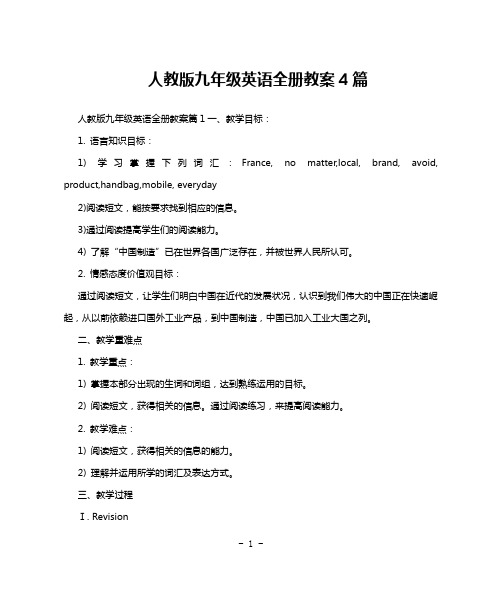
人教版九年级英语全册教案4篇人教版九年级英语全册教案篇1一、教学目标:1. 语言知识目标:1) 学习掌握下列词汇:France, no matter,local, brand, avoid, product,handbag,mobile, everyday2)阅读短文,能按要求找到相应的信息。
3)通过阅读提高学生们的阅读能力。
4) 了解“中国制造”已在世界各国广泛存在,并被世界人民所认可。
2. 情感态度价值观目标:通过阅读短文,让学生们明白中国在近代的发展状况,认识到我们伟大的中国正在快速崛起,从以前依赖进口国外工业产品,到中国制造,中国已加入工业大国之列。
二、教学重难点1. 教学重点:1) 掌握本部分出现的生词和词组,达到熟练运用的目标。
2) 阅读短文,获得相关的信息。
通过阅读练习,来提高阅读能力。
2. 教学难点:1) 阅读短文,获得相关的信息的能力。
2) 理解并运用所学的词汇及表达方式。
三、教学过程Ⅰ. Revision1. Ask Sstorole-play the conversation in 2d.2. Checkthehomework. Let some Ss tell read their sentences.(1). This ringismade of silver.(2). This kindofpaper is made from wood.(3). What ispaintmade from?(4). Hang Zhouisfamous for tea.(5). As far asIknow, tea plants are grown on the sides of the mountains.Ⅱ. Lead in1. 展示一段伦敦奥运会礼品的视频,让学生了解中国制造已被世界人民所接受。
Then ask Sssomequestions:T: As we know,thereare so many things made in China in England. What about in America andothercountries in the world? Now let’s read the passage of 3a.First, readquickly and find the answer to this question:1) Where did KangJianvisit last year?2) Were theremanythings made in China in the US?3) What twothingsdid Kang Jian want to buy in the US?4) Where weretheymade?Ss read thearticlequickly and try to answer the questions:2. 方法指导:带着问题,然后快速阅读短文,争取在较短的时间内,找到答案。
人教版九年级英语教案(全)
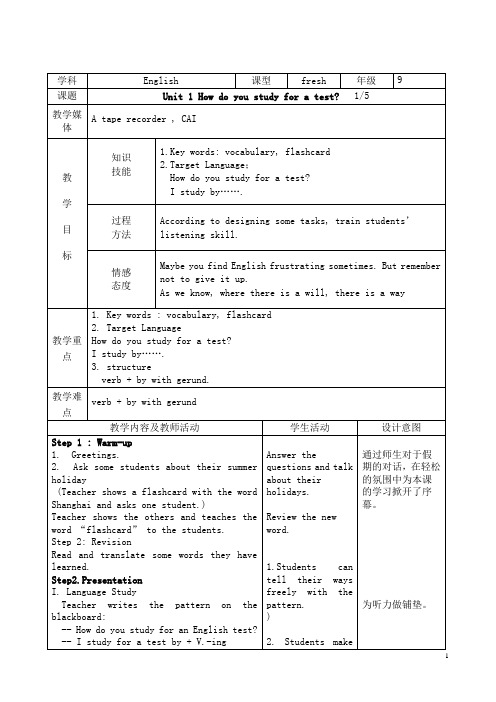
2. Students makeconversationsbased on the pattern.( V. + by + V.-ing
Do exercise in1a
Write some good ways what they use.
Students listen and write the letters for each one.
2. Ask some pairs to present their conversations.
3. Smallcompetition: group in four, make sentences usingstructure (verb + by/with gerund).
4.Make a survey : one student interview other students using the structures (How do you study …?Istudy by + v-ing .)
B: I study by working with a group.
教
学
反
思
学科
English
课型
fresh
年级
9
课题
Unit 1Howdo you study for a test? 2/5
教学媒体
A tape recorder, CAI
教
学
目
标
知识
技能
1.Keywords:aloud, pronunciation,What about …?
verb + by with gerund.
教学难点
verb + by with gerund
最新人教版九年级英语全册教案Unit 1 教案
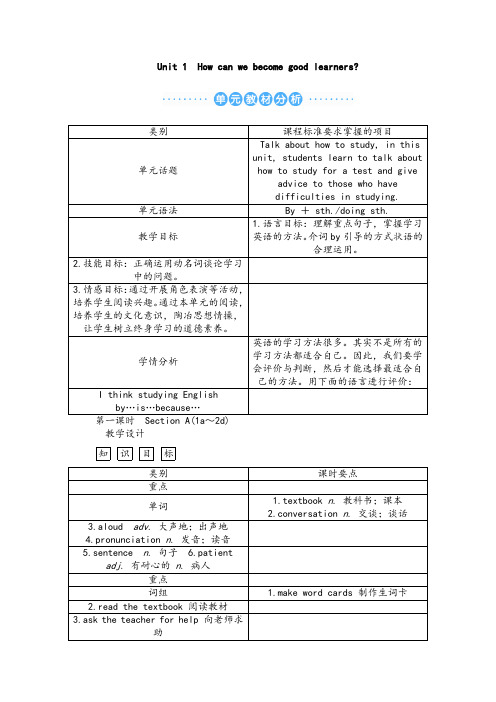
Unit 1How can we become good learners?类别课程标准要求掌握的项目单元话题Talk about how to study, in this unit, students learn to talk about how to study for a test and give advice to those who havedifficulties in studying.单元语法By + sth./doing sth.教学目标1.语言目标:理解重点句子,掌握学习英语的方法。
介词by引导的方式状语的合理运用。
2.技能目标:正确运用动名词谈论学习中的问题。
3.情感目标:通过开展角色表演等活动,培养学生阅读兴趣。
通过本单元的阅读,培养学生的文化意识,陶冶思想情操,让学生树立终身学习的道德素养。
学情分析英语的学习方法很多。
其实不是所有的学习方法都适合自己。
因此,我们要学会评价与判断,然后才能选择最适合自己的方法。
用下面的语言进行评价:I think studying Englishby…is…because…教学设计知识目标类别课时要点重点单词1.textbook n. 教科书;课本2.conversation n. 交谈;谈话3.aloud adv. 大声地;出声地4.pronunciation n. 发音;读音5.sentence n. 句子6.patientadj. 有耐心的n. 病人重点词组 1.make word cards 制作生词卡2.read the textbook 阅读教材3.ask the teacher for help 向老师求助课堂环节§自主学习案翻译下列词组。
1.通过制作生词卡by__making__word__cards2.通过听录音带by__listening__to__tapes3.向某人寻求帮助ask__sb.for__help4大声读来练习发音read__aloud__to__practice__pronunciation 5.小组合作学习study__with__a__group6.和朋友练习对话practice__conversations__with__friends7.逐个单词word__by__word8.作报告give__a__report9.意群word__groups10.慢慢来it__takes__time11.口语技能speaking__skills12英语口语spoken__English§课堂导学案Step 1 准备与热身(Preparation)Leadin with a free talk(自由对话导入新课)(2分钟)Greeting with the students:Hello, everyone.Welcome back to school.I'm very happy to see you again.Most of you got good grades last term ! Of course, don't lose your heart if you didn't get good grades.OK.Today, let's talk about how to study for a test and how to learn English well.T: How do you study English? Do you study English by the following ways? (Show some pictures and present the important phrases.) T: How do you study English?S: I study English by ________.working with friends making word cardsasking the teacher for help reading the textbookworking with a group listening to tapesStep 2 呈现与输入(Presentation)1.要求学生翻开课本P1,迅速阅读1a部分的内容。
新人教版九年级英语全册教案
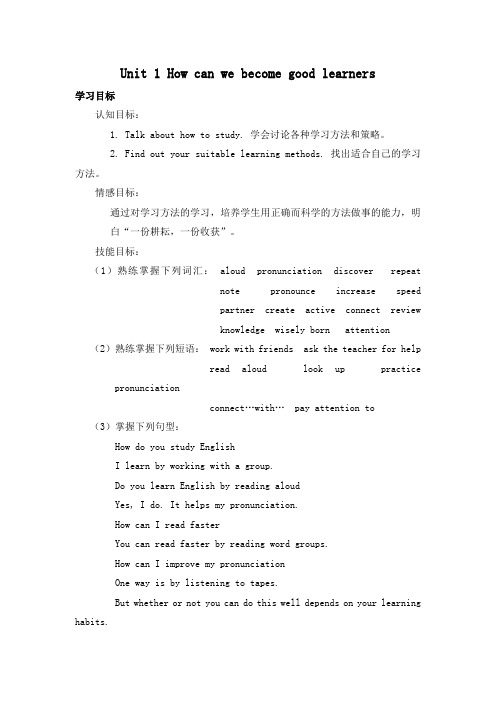
Unit 1 How can we become good learners学习目标认知目标:1. Talk about how to study. 学会讨论各种学习方法和策略。
2. Find out your suitable learning methods. 找出适合自己的学习方法。
情感目标:通过对学习方法的学习,培养学生用正确而科学的方法做事的能力,明白“一份耕耘,一份收获”。
技能目标:(1)熟练掌握下列词汇: aloud pronunciation discover repeatnote pronounce increase speedpartner create active connect reviewknowledge wisely born attention (2)熟练掌握下列短语: work with friends ask the teacher for helpread aloud look up practice pronunciationconnect…with… pay attention to (3)掌握下列句型:How do you study EnglishI learn by working with a group.Do you learn English by reading aloudYes, I do. It helps my pronunciation.How can I read fasterYou can read faster by reading word groups.How can I improve my pronunciationOne way is by listening to tapes.But whether or not you can do this well depends on your learning habits.重点、难点(Key points and difficulties)1. 学会运用how来询问做事方式2. 学会运用by + doing的结构表达做事方式。
新人教版初中英语九年级全册精品教案

新人教版初中英语九年级全册精品教案(共180页)--本页仅作为文档封面,使用时请直接删除即可----内页可以根据需求调整合适字体及大小--Unit 1How can we become good learners? Language Goal【语言目标】Talk about how to study Knowledge Goals【知识目标】Key Wordstextbook,conversation,aloud,pronunciation,sentence,patient,expression,discover,secret,grammar,repeat,note,physics,chemistry,pronounce,increase,speed,partner,born,ability,create,brain,active,attention,connect,review,knowledge,wiselyKey Phrases look up,ask help,fall in love with,be born with,payattention to,connect…withKey Sentences1.—How do you learn English?—I learn by studying with a group. 2.—Do you learn English by reading aloud?—Yes,I helps my pronunciation.3.—How can I read faster?—You can read faster by reading word groups. 4.—How can I improve my pronunciation?—One way is by listening to tapes.Key Grammar Learn to use “verb+by doing(gerund)” to express ways ofdoing things.Ability Goals 【能力目标】listening,speaking,reading and writing skills by usingthe target languages.2.Learn to talk about ways of studying,give suggestions to help others overcome their obstacles in study and discuss how to learn better using “by doing sth.”.Moral Goals 【情感目标】 the help of this unit's study,students can think and learn how to study English and they will be encouraged to be active and hard-working learners. 2.Learn to communicate and cooperate with others instudy.Teaching Time【课时】Five periodsPeriod 1Section A(1a-2d) Period 2Section A(3a-4c) Period 3Section B(1a-1e)Period 4Section B(2a-2e)Period 5Section B(3a-3b) & Self Check本单元围绕学习的话题,讲述了学习的障碍及对应的解决方法,对学生的学习有重要意义。
人教版九年级英语全册教案4篇
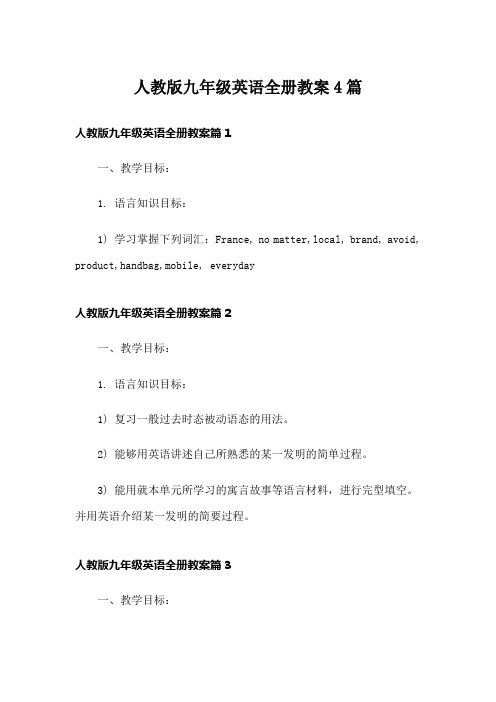
人教版九年级英语全册教案4篇人教版九年级英语全册教案篇1一、教学目标:1. 语言知识目标:1) 学习掌握下列词汇:France, no matter,local, brand, avoid, product,handbag,mobile, everyday人教版九年级英语全册教案篇2一、教学目标:1. 语言知识目标:1) 复习一般过去时态被动语态的用法。
2) 能够用英语讲述自己所熟悉的某一发明的简单过程。
3) 能用就本单元所学习的寓言故事等语言材料,进行完型填空。
并用英语介绍某一发明的简要过程。
人教版九年级英语全册教案篇3一、教学目标:1. 语言知识目标:1) 学习掌握下列单词和短语:block, in linewith, worker, stare, disbelief, above,burn, burning, alive, airport, till ,west2) 能掌握以下句型:Life is full oftheunexpected.I was about to goupwhen I decided to get a coffee first.As I was waitinginline with other office workers, I heard a loud sound.Before I coldjointhe others outside to see what was going on, the first plane had alreadyhit myoffice building.3) 进一步熟练掌握过去完成时的用法。
2. 情感态度价值观目标:1) 通过学习使学生认识到生活中充满着许多出乎预料的事件,培养学生正确看待事物的积极心态。
2)能运用所掌握的语法,句型和词汇进行交流。
3)能比较流利地讲述自己曾经有的特别的一天。
二、教学重难点1. 教学重点:1)掌握本课时中出现的生词block, in linewith,worker, stare, disbelief, above, burn, burning, alive, airport, till ,west2) 学会用过去完成时叙述自己曾经有的特别的一天。
人教版九年级英语第一学期教案(全册)
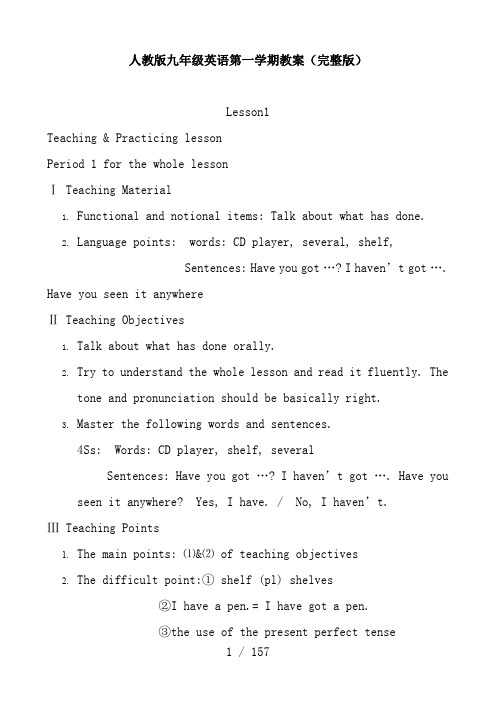
人教版九年级英语第一学期教案(完整版)Lesson1Teaching & Practicing lessonPeriod 1 for the whole lessonⅠ Teaching Material1.Functional and notional items: Talk about what has done.nguage points: words: CD player, several, shelf,Sentences: Have you got …? I haven’t got …. Have you seen it anywhereⅡ Teaching Objectives1.Talk about what has done orally.2.Try to understand the whole lesson and read it fluently. Thetone and pronunciation should be basically right.3.Master the following words and sentences.4Ss: Words: CD player, shelf, severalSentences: Have you got …? I haven’t got …. Have you seen it anywhere? Yes, I have. / No, I haven’t.Ⅲ Teaching Points1.The main points: ⑴&⑵ of teaching objectives2.The difficult point:① shelf (pl) shelves②I have a pen.= I have got a pen.③the use of the present perfect tenseⅣ Teaching Procedureanization of the classA.GreetingB.Raise requirementT: We’re going to talk about the library.2.ReviewA.OralT: Do we have a library in our school? What do we have in the library? What can we do in the library?3.The teaching of the new lessonLesson 1T: Let’s learn Unit 1 In the library, Lesson 1. (write down the title)Teach: Have you got …?T: If you want to borrow a history book from the library, what do you say?Ss: Excuse me, do you have a history book?T: Yes, and we can also say: Have you got a history book?Write down the new sentence and compare the new one and the old one. Then teach the negative form and simple question form.And make more examples.Examples: He has got a good pen.They haven’t got any water.Our school has got a lot of students.B、Teach: Part 1T: Have you got a ruler? S1: Yes, I have. Here you are.T: Have you got an umbrella? S2: Sorry, I haven’t. Ask …Ask the Ss to use Part 1 to make new dialogue in pairs and then ask some to do it in front of the class. Teach “ CD player” at the same time.B.Teach: severalT: Have you got a pen? How many pens have you got?S1: FiveT: We may also say: “You’ve got several pens.”Write down the word: severalB.Teach: shelfT: Just now we talked about the library, we know there are many books in the library. Where are the books put?Teach: on the shelf shelf (pl) shelvesB.Part2T: Now I’d like you to make a dialogue talking about borrow ing books about different subjects.Do it in pairs first then ask some to do it.Analysis: books about … at the moment = now = right now B.Part 3Dialogue 1Listen and answer: Well, when you borrow books from the library, you must be careful, but Jim is not careful.What happened? Where was the book?Then read it and learn the dialogue.Analysis: Have you seen it anywhere? ( tense and the use of anywhere) Dialogue 2Listen and answer: How about Tom? What has he lost? Where was it?Read and learn.Analysis: have lost (tense)Perhaps he’s seen it. ( ‘s is short for has)I saw it on Lin Tao’s desk five minutes ago. ( tense)B. Conclusion1. have got = have 2 several = a few 3.on the shelf4. the present perfect tenseA.Wb. Ex1 &24.Homework1.Do Wb. Ex 3&42.Recite Part 3Lesson 2Reading lesson2 periods for Lesson 2ⅠTeaching Materialsnguage points:Words: already, yard, schoolyard, step, librarian, probably, pay, sadly, mark, bookmarkPhrases: used to, put down, pay for, come up withSentences: Her hobby is reading.So was the librarian.Now her lost books are usually returned to the library.ⅡTeaching Objectives1.Read the whole lesson and try to understand its content. Makesure to answer the questions in Wb correctly.2.Read the lesson fluently, the pronunciation and tone should beright.Ⅲ Teaching Points1.The main points---(1)&(2) in teaching objectives2.The difficult pointsA: already, “al” makes an / / soundB: the difference between “on” and “about”C: make sb. + adj.D: used to do sth.E: come up with an idea= think of an ideaPeriod 1Ⅳ Teaching Procedureanization of the classT: Today we are going to Lesson 2, in Lesson 2, we are going to talk about the library.2.ReviewT: Before we learn the new lesson, let’s go over what we learned yesterday.A.OrallyHave = have got eg. They don’t have any shelves.= They haven’t got any shelves.Has = has got eg. Does he have a CD player?= Has he got a CD player?Several=a fewOn the shelfThe construction and concept of the present perfect tenseB.Recite Part 2C.Wb. Ex33.The teaching of the new lessonA.Lesson 2T: We know we can borrow books from a library. But if we lose the books, what should we do? Let’s go on to learn Lesson 2, we will know the answer in it.( write down Lesson 2) B.pay forWell, you should pay for it.Teach: pay, paid, paidPay for : give money to sb. for sth.C.onT: Why do people like to go to the library?T: Because there are books on many different subjects. D.knowledgePeople can learn much knowledge from them.E.Part 1 Pre-readF.Part 2Ask the Ss the read the passage and answer questions in their Wb. Ex 1G.Read and learnParagraph 1T: How old is the writer’s grandma?What was she?What is her hobby?Why does she love books?4.Homework.A. Read the end of the text and finish the exercises in Wb.Junior English for ChinaBook 3Lesson 3课型:讲练课ⅠTeaching Materials1.Functional and notional itemsAsk questions about something has donenguage MaterialsWords: encourage, once, abroad, copyPhrases: think of, encourage sb. to do sth., get sth. back, pick upSentences: Have you ever been abroad? Yes, just once.I’ve just cleaned the kitchen.Really? I did that hours ago.Grammar: The difference between the present perfect tense and the past indefinite tenseⅡTeaching Objectives1.Learn to ask questions about something has done2.Read the whole lesson fluently, and pronunciation and intonationshould be right.3.Master the following materials(4 skills) Words: once, copyPhrases: think of, pick upSentences: Have you been abroad? Yes, only once.(3 skills) Words: encourage, abroadPhrases: get sth. back, be abroadⅢ Teaching Points1.The main points: (1)&(2) in teaching objectives2.The difficult points:A.“ever, just, already”, they should be put in the middleof “ have done”B. The difference between the present perfect tense and thepast indefinite tenseⅣ Teaching Procedureanization of the class2.RevisionBefore we go on to learn the new lesson, let’s go over what we learn in Lesson 2.A.OralGrandma lost library books. If she really lose them, what should she do?Did the librarian have any ideas? What is it?What did they doB. Workbook Ex23.The teaching of the new lessonA.Lesson 3Can Grandma get all her lost books back? Let’s go on to learnLesson 3.B.Read Part 1 and answer the following questions:Did Grandma get all her lost books back?How did she get them back?C.Read and learn*Think of:认为、想起、想出Eg: What do you think of it?I often think of my friends in Beijing.*Encourage sb. to do sth.Eg. The teacher thought a lot about how to encourage his students to study hard.*Pick up: pick it\them up*return sth. to sb.*get sth. from sb.D.Reading practiceE.Retell the storyF.Ask and answerHave you ever picked up a library book? Yes, I have\ No,I haven’t.Ask the students to ask and answer in pairs by using Part2 and ask some to do it in class.Teach: abroad, onceDo Wb. Ex1G.Part 3Play and English songT: Have you ever listened to foreign music?Ss: Yes, we have.T: And we have just listened to it.Make sentences by using “ I have just…”Read and learnTeach: copyPoint out the difference between the present perfect tenseand the past indefinite tense.The present perfect tense s houldn’t be used together withthe past time.H.Conclusion●the use of “ever, just, already” in the present perfecttense●the difference between the present perfect tense and thepast indefinite tense4.HomeworkA.Wb. EX2&3B.Go over the language pointsLesson 4课型:练习课ⅠTeaching Materialsnguage MaterialsWords: spoil, as, screenPhrases: on the computer, find outSentences: I guess somebody else has borrowed it.Could you find out who has taken it?Grammar: The present perfect tenseⅡTeaching Objectives4.Read the whole lesson fluently, and pronunciation and intonationshould be right.5.Learn to read the information on the library cards and thecomputer screen.6.Master the following materials(4 skills) Word: asphrase: on the computer, find out(3 skills) Words: spoil, screenⅢ Teaching Points3.The main points: (1)&(2) in teaching objectives4.The difficult points: learn to read the information on thelibrary cards and the computer screenⅣ Teaching Procedureanization of the classToday, we are going to learn Lesson 4. In Lesson 4, we’re going to talk about the information on the library cards and thecomputer screen.6.RevisionBefore we go on to learn the new lesson, let’s go over what we learn in Lesson 3.A.OralHow could Grandma get all her lost books back?the use of the adverbs in the present perfect tense.7.The teaching of the new lessonA.Lesson 4Yesterday, we learned that grandma usually borrowed books from the library. There is a new library today. If you want to read books, how can you find them? Let’s go on to learn Lesson 4.B.Part1I’d like you to listen and do Wb. Ex.1C.Part 2Ask the students to write down something about the school librarian and report it to the class. Teach: as He works there as a shop assistant.D.Part 4Learn to read the information on the cards and the computer screen.E.Part 3Listen and answer: What does the boy want to borrow?What’s its name?Who has borrowed it?Read and learn.has borrowed, has taken, has got( the present perfect tense)find outRead and act.F.Part 5Read and learn.G.Checkpoint 1H.Wb. Ex.2&58.HomeworkA.Wb. Ex 3B.Go over the whole unit.Lesson 5课型:讲练课ⅠTeaching Materials4.Functional and notional itemsA. Learn to ask how long sb. has done sth.B. Learn to talk about if someone has been to a place.nguage MaterialsWords: surf, surfing, surfer, wave, Hawaii, beach, twice, Bondi, none, Newquay, water-ski, canoePhrases: have a try, since last Wednesday, learn sth. from sb.how to do it, several timesSentences: What’s …like?How long have you been in Sydney?Have you ever been to …?Grammar: the present perfect tenseⅡTeaching Objectives7.Learn to ask questions about something has done8.Read the whole lesson fluently, and pronunciation and intonationshould be right.9.Master the following materials(4 skills) Words: surf, surfing, surfer, wave, beach, twice,nonePhrases: have a trySentences: Have you been to…? Several times.(3 skills) Words: water-ski, canoe(1 skill) Words: Hawaii, Bondi, NewquayⅢ Teaching Points5.The main points: (1)&(2) in teaching objectives6.The difficult points:A.“ever, just, already”, they should be put in the middleof “ have done”B. The difference between the present perfect tense and thepast indefinite tenseⅣ Teaching Procedureanization of the classToday, we’re going to talk about water sports.2. RevisionRevise the names of the sports they have learnt: roller-skating, skating, jump, race, skiing.10.The teaching of the new lessonA.Lesson 5And swimming is a kind of water sport because you have to swim in the water.Well, what other water sports do you know? Let’s go on to learn Unit 2 Water sports.e colour page1 to teach: surf, surfing, surfer, wave,water-skiing, canoe.C.Part 1Listen and answer: Who can surf, Ted or Bruce?How long has Bruce been in Sydney?Why did he come to Sydney?Who teach Bruce to surf?Read and learn:What’s …like? = How is …?Since last WednesdayLearn sth. from sb.Have you ever been to …?Have a tryHow to do itD.Read and act.E.Part 2Have you ever surfed?Have you ever been to Hawaii?Ask and answer in pairsLearn: Bondi, Cape Town, Newquay, noneNo one 人单数 No one is herenone 人/物单数/复数 None of them is here.F.Wb. Ex3. 2 . 1 .G.ConclusionSurf, surfing, surfer, waveHe’s a surfer. Have a tryHow long have you been in …?Have you ever been to …?11.Homeworkwb. Ex 2P.S.The writing on the blackboardUnit 2 Water sportsLesson 5surf ①What’s …like? = How is …? Have a try surfing ②How long have you been in …? learn sth. from sb.surfer Since last Wednesday no one 人/ 单wave ③Have you ever been to …? none人/物单/复Hawaii ④None of us has. none of us (true)Cape Town No one has. no one of us (false)Lesson 6ⅠTeaching MaterialsWords: describe, especially, attract, so-called, possible, since, part-time, although, fit, prize, competition, event, Olympic, Waikiki, Honolulu, San FranciscoPhrases: all over, large numbers of, no matter, both…and…, give up, ever since, the Olympic GamesSentences: Now it is enjoyed by people all over the world.You can always find surfers out riding the waves.In the morning, he works as a part-time assistant in asurf shop.ⅡTeaching Objectives1.Try to understand the whole passage and read the whole lessonfluently and the pronunciation and intonation should be right.2.Master the following materials:4Ss Words: describe, especially, attract, so-called, possible, since, part-time, although, fit, prize,competition, event, OlympicPhrases: all over, large numbers of, no matter, both…and…, give up, ever since, the Olympic GamesSentences: Now it is enjoyed by people all over the world. You can always find surfers out riding the waves.In the morning, he works as a part-time assistant in a surf shop.3.Master the following materials:3Ss Words: Waikiki, Honolulu, San FranciscoⅢ Teaching Points1.The main points: (1) &(2) in teaching objectives2.The difficult points: A. the use of “although” B. the use of“no matter”C. the use of “ both…and…”Ⅳ Teaching ProcedurePeriod 1anization of the classTalk about surfing2.ReviewHave you ever been to Qingdao?Who has ever been to Bondi Beach? None of us.Has anybody water-skied before? Nobody has.3.The teaching of the new lessonA.Lesson 6In Lesson 5, we learned some water sports. Today, we are going to talk about one of them----surfing.B.Talk about surfingWhere is the best place for surfing? Why?Have you ever watched people surf?What do you think of it?Ask the students to say something about it.Teach: fit, prize, competitionSurfing will make you fit( healthy). Maybe you can take partin a surfing competition, then you may win a prize.Part 1 Pre-read Ask and answer then teach: watch sb. do sth.; describe sth.C.Part 2Read and do wb. Ex.1D.Conclusion.fit, win a prize4.HomeworkA.Go over what we learn todayB.Read the passage and find out all the new words, try to guesstheir meaning.Period 2Teaching Procedureanization of the classLearn the passage2.ReviewWatch sb. do sth.; fit(healthy); win a prize3.The teaching of the new lessonA. Paragraph 1Find out the key sentence. Then learn the new language points.one of…; be enjoyed by sb.; all over the world= everywhere in the world;be famous for\ as; especially; attract sb. to somewhere; large numbers of people(it is used to modify countable nouns)= a number ofRead this paragraph after the tape and then read it together.Ask some to read it in classB. Paragraph 2Find out the key sentence. Then learn the new language points..Read this paragraph after the tape and then read it together.Ask some to read it in classC.Paragraph 3Find out the key sentence. Then learn the new language points.D.Paragraph 4Find out the key sentence. Then learn the new language points.E.Conclusion4. HomeworkA.Wb. Ex. 2&3B.Retell the storyLesson 7课型:讲练课ⅠTeaching Materials1.Functional and notional itemsLearn to talk about something has donenguage materialsWords: such, fail, practice, New Zealand, businessPhrases: such great fun, on business, so farSentences: Time flies!He’s gone to New Zealand on business.ⅡTeaching Objectives1.Learn to talk about something has done.2.Try to understand the content and read the dialogue fluently,the pronunciation and intonation should be right.3.Master the following materials:4 skills Words: such, fail, practice, businessPhrases: so far, on businessSentences: He’s gone to …4.Master the following materials:2 skills Words: New ZealandⅢTeaching Points1.The main points: (1) & (2) in teaching objectives2.The difficult pointsA.such great funsuch+adj. +n.(不可数/复数)such a + adj. + n.(可数名词单数)与 so的区别B.have been surfingC.practice sth.\ doing sth.D.gone to & been togone to去了,强调不在说话地点been to 去过,强调对某地有所了解,可以在说话地点ⅣTeaching Procedureanization of the classWe are going to talk about Bruce and Ted again. In grammar, we are going to talk about the present perfect tense.2.RevisionA.Retell the story in Lesson 6.B.Wb. Ex2&33.The teaching of the new lessonA.Lesson 7In lesson 5, we know Bruce will show Ted how to surf. Can Tedsurf now?B.Listen and answerCan Ted surf? What has Bruce been doing every day? Why?When is Ted leaving for home?How about Bruce?Where is Bruce’s uncle?C.Read and learnTeach: *on Bondi Beach*such great fun: very funnysuch+adj. +n.(不可数/复数) such beautiful flowerssuch a + adj. + n.(可数名词单数) such a beautiful flowerso+ adj. So beautiful a flower如果在数量词“many, much, few, little”前,要用“so”eg: so much water, so many people* fail (in) the examfail to do sth.=can’t do sth.eg: fail the exam=not pass the examfail to catch the bus= miss the bus* need more practicepractice: 练习,实践(为不可数名词)如: Practice makes perfect.Practice : 练习(为及物动词)如:practice doing sth.* Time flies.* gone to去了,强调不在说话地点been to 去过,强调对某地有所了解,可以在说话地点eg: Where is he? He’s gone to his home.* on businessD.Reading Practice.E.Part 2 Ask and answeryet 用于否定句,一般疑问句及条件状语从句already用于肯定句,如果用于一般疑问句则表示惊讶的语气F.Answer the questions in groups. Teach: so far: up to nowAsk some to do it in classG.ConclusionH.Wb. Ex 14.HomeworkA.Recite Part 1B.Go over the whole lessonLesson 8课型:练习课ⅠTeaching MaterialsWords: cross, channel, mainland, slow, journey, among, proud, pride, unless, shot, truthPhrases: come true, slow down, be proud of, speak highly of, not only…but also…Sentences: Among them were his parents.He is not only the pride of our school, but also the pride of all the people in Hainan.ⅡTeaching Objectives1.Read the passage in Part 3 and try to understand its meaning.Read it fluently and the pronunciation and intonation should be right.2.Finish all the exercises in this lesson.3.Master the following materials as four skills:Words: cross, channel, mainland, slow, journey, among, proud, pride,Phrases: come true, slow down, be proud of, speak highly of, not only…but also…Sentences: Among them were his parents.He is not only the pride of our school, but also the pride of all thepeople in Hainan.4. Master the following materials as three skills: words: unless,shot, truthⅢTeaching Points1.The main points: (1) & (2) in teaching objectives2.The difficult points: not only…but also…如果连接两个主语时,用就近一致原则。
- 1、下载文档前请自行甄别文档内容的完整性,平台不提供额外的编辑、内容补充、找答案等附加服务。
- 2、"仅部分预览"的文档,不可在线预览部分如存在完整性等问题,可反馈申请退款(可完整预览的文档不适用该条件!)。
- 3、如文档侵犯您的权益,请联系客服反馈,我们会尽快为您处理(人工客服工作时间:9:00-18:30)。
Unit 1 How can we become good learners?学习目标认知目标:1. Talk about how to study. 学会讨论各种学习方法和策略。
2. Find out your suitable learning methods. 找出适合自己的学习方法。
情感目标:通过对学习方法的学习,培养学生用正确而科学的方法做事的能力,明白“一份耕耘,一份收获”。
技能目标:(1)熟练掌握下列词汇: aloud pronunciation discover repeatnote pronounce increase speed partnercreate active connect review knowledgewisely born attention(2)熟练掌握下列短语: work with friends ask the teacher for helpread aloud look up practice pronunciationconnect…with… pay attention to (3)掌握下列句型:How do you study English?I learn by working with a group.Do you learn English by reading aloud?Yes, I do. It helps my pronunciation.How can I read faster?You can read faster by reading word groups.How can I improve my pronunciation?One way is by listening to tapes.But whether or not you can do this well depends on your learning habits.重点、难点(Key points and difficulties)1. 学会运用how来询问做事方式2. 学会运用by + doing的结构表达做事方式。
by 介词,表示“通过……方法或途径”,译成“靠、通过”。
by后面可以加名词或动名词短语。
3. 动名词的构成:动词后加动名词doing,相当于名词,在句子中可以做主语、宾语、表语定语等。
课时划分Period 1 Section A 1 (1a-2d)Period 2 Section A 2 (3a-3b)Period 3 Section A 3 (Grammar Focus—4c)Period 4 Section B 1 (1a-2e)Period 5 Section B 2 (3a-selfcheck)Section A 1 (1a-2d)Step 1 Warming upT: How do you study English? Do you study English by the following ways? (Show some pictures and present the important phrases.)T: How do you study English?S: I study English by ______.by working with friends.by making word cards.by asking the teacher for help.by reading the textbook.by working with a group.by listening tapes.Step 2 1a Check the ways you study English. Then add other ways you sometimes study.___ a. by working with friends.___ b. by making word card.___ c. by reading the textbook.___ d. by listening to tapes___ e. by asking the teacher for help.…Step 3 Listening1) Listen. How do these students study for a test? Write letters from 1a above.2) Check the answers: b (Meiping); e (Peter); d (Tony)Step 4 GuessShow some pictures.Guess: How does he/she study English? He/She studies English by…How do they study English? They study English by…Step 5 Pairwork1c Make conversations about how you study for a test.A: How do you study for a test?B: I study by working with a group.A: How do you study for a test?B: I study by…Step 6 Listening2a Listen and check the questions you hear.1 ____ Does anyone learn English by watching videos?2 ____ Do you have conversations with friends in English?3 ____ What about listening to tapes?4 ____ What about reading aloud to practice pronunciation?5 ____ Have you ever studied with a group?Answers: 1, 2, 4, 52b Listen again. Match each answer below with a question above.a. Yes, I have. I’ve learned a lot that way.b. Oh, yes. It really improves my speaking skills.c. I do that sometimes. I think it helps.d. No. It’s too hard to understand spoken English.Answers: d, b, c, aStep 7 Pairwork1. 2c Make conversations using the information in 2a and 2bA: Have you ever studied with a group?B: Yes, I have. I’ve learned a lot that way.Show some pictures.1) A: Do you learn English by watching movies?B: Yes, it’s a very interesting way.C: No, it’s too hard to understand spoken English.2) A: What about writing letters to a pen pal in America?B: Yes, it helps to improve my writing skills and know a lot about America.3) A: Do you have conversations with friends in English?B: Of course, we can talk about plenty of things like school, pets, movies, and our parents.2. 2c Role-play the conversation.Step 8 SummaryHow do you study English?1. by working with friends2. by watching English movies.3. by making word cards.4. by reading the textbook.5. by listening to tapes.6. by asking the teacher for help.7. by reading aloud.…Step 9 Language points1. I study by working with a group.我通过小组活动来学习。
by作为介词,用法很多。
请仔细观察下面的例句,分析by的用法,然后补全结论部分所缺的内容。
【例句】1) Come and sit by us.2) Peter goes to work by bus every day.3) Tony will come back by 10:00 pm.4) English is spoken by lots of people.5) My brother studies history by working with a group.【结论】1) by可表示位置,(1) “__________”,如句1。
也有“从……旁边(经过)”之意。
2) by可表示交通、传递等的方式,如句2。
3) by可表示时间,“到(某时)之前;不迟于”,如句3。
4) by可用于构成(2) ________,“被,由”,如句4。
5) by可表示方式或手段,(3) “____________”结构在句中作方式状语,“通过……方式(方法)”或“借助……手段”,如句5。
Answers: (1) 在……旁边 (2) 被动语态 (3) by + V-ing形式【运用】根据提示,用含有by的短语完成各句。
1) Annie went to Beijing _______ (乘火车) yesterday.2) His grandfather made a living _________ (靠卖水果) in the past.3) The scientists have to arrive at the village _________ (八月以前).4) Allen goes _______________ (经过邮局) on his way to schooleverymorning.5) The book was written ____________ (由几个工程师).Answers: 1) by train 2) by selling fruits 3) by August 4) by the post office 5) by several engineers2. What about reading aloud to practice pronunciation?大声朗读来练习发音怎么样?辨析aloud, loud和loudlyaloud出声地;大声地。
